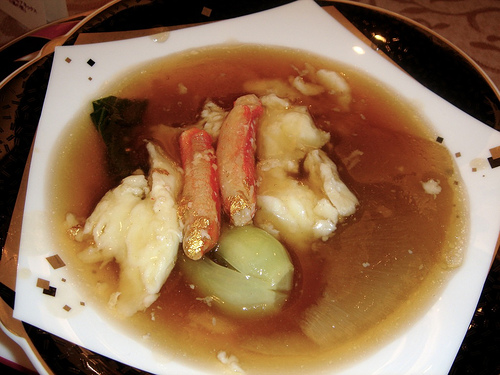One of the main ingredients in a culturally important dish, which stood for power and wealth for many generations, is the shark fin. It has become a source of debate and conflict throughout the world. Hawaii passed legislation that will make possession of shark fin an offense subject to a $5,000 to $15,000 fine for the first offense after June 30, 2011. Now, California, Oregon and Washington have introduced similar legislation. As the debate heats up, here's a quick guide to what's going on:
What is shark fin? Well, it's exactly what it sounds like. A fin from any number of shark species from around the world. One of the most controversial parts of the debate involves how the fins are harvested. Often times, the sharks will be hoisted onto ships alive, their fins will be removed, and they will be thrown back into the ocean where they will sink to the bottom and die. California assemblyman Paul Fong, who supports the ban, said, "It's like removing the tusks from elephants and paws from tigers. If sharks fall like a house of cards, the rest of the ocean will fall."
Is that the main argument against it? It's not. After all, many of the foods we enjoy on a regular basis (chicken, beef, for example) are subject to inhumane conditions during their lives, but we wouldn't dream of banning them in the United States. No, in addition to the concerns about how the fins are harvested, researchers warn of the devastating environmental consequences with the practice. More people can now afford the expensive dish, and researchers fear 73 million sharks are killed for their fins annually.
What are the arguments against the ban? Most of the people who oppose the ban say its anti-Chinese legislation, designed to remove a key part of their heritage. Leland Yee, who is running for mayor of San Francisco, opposes the bill and calls it "an attack on Asian culture." Fisherman claim that they use the entire carcass of the shark and say that the fin cannot be imported unless the entire animal is utilized.
Have people responded to those claims? Yes, they have. My first response is that we should hope that the Chinese culture won't collapse without one dish that is currently devastating our oceans. Other cultural practices that people have considered important include female genital mutilation and slavery. We wouldn't defend those today. Just because something is a cultural delicacy doesn't mean that it should avoid scrutiny with additional knowledge. Finally, chef Gordon Ramsay looked into the practice and his footage disproves the claim that all the shark is used.

Photo by Flickr user jmurawski











Comments
March 8, 2011
Your article was a very interesting read but I was hoping for a more educational response at the end when you compared the controversy with sharks with the human-related issue of female genital mutilation and slavery.
I don't understand why didn't you compare it with other issues such as force feeding geese for obtaining the delicacy of foie gras or caging chickens in unsanitary conditions to be quickly plumped up for slaughter?
Your regretful response at the end indicated that you have no respect for the Chinese culture. Although some of their social norms are a bit eccentric, I do agree that one dish will not "collapse" Chinese culture. Instead, you could have explored other resolutions such as farming or regulatory fishing with a permit.